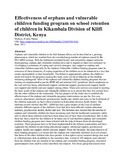| dc.description.abstract | Orphans and vulnerable children in the Sub Saharan Africa can be described as a growing phenomenon, which has resulted from the overwhelming number of orphans caused by the HIV/AIDS scourge. With the traditional extended family and community support networks disintegrating, orphans and vulnerable children have had to depend on their own resilience by i1eveloping a continuum of coping and survival strategies. Any support to orphans and vulnerable children especially by the Orphans Vulnerable Children funding programs must be conscious of these dynamics, if coping capacities of the children are to be enhanced in a way that creates sustainability in their households.
The failure to appropriately address the children's needs will lead to the programs running for many years yet the livelihoods of the children remaining endangered. Most of the orphans and vulnerable children funding programs that are running are implemented as per the PEPF AR and national OVC guidelines which emphasize on the core services being: educational support, nutritional support, psychosocial support, health care support and shelter and care support among others. These core services are aimed at meeting the basic needs of the orphans and vulnerable children so as to ensure that they live normal lives like the other children in the community. The key purpose of this study was to establish the effectiveness of the orphans and vulnerable programs interventions (as per the. five core services-educational, nutritional, psychosocial, health care, shelter and care) on the livelihoods of the children especially on their school retention in Kikambala division, Kilifi district. The literature review showed that HIV / AIDS has had a great impact on the lives of children whereby different aspects of the children's lives that have been affected include education, nutrition, psychosocial, health, shelter and care.
The literature also showed that the number of orphans and vulnerable children has been increasing such that the traditional community safety nets in which these children could have been taken care of have been overwhelmed. Due to this there has been a need for the children to be taken care of and therefore orphans and vulnerable children funding programs have been initiated with the help of donors from the developed countries. These programs have so far been implemented in the African communities and have supported the children by providing educational support, nutritional support, psychosocial support, health care support, shelter and care support. From the literature, the main objective of these funding programs is to ensure that the orphans and vulnerable children's lives are normal like those of the other children who have parents. A descriptive survey research design was used to collect primary data in addition to the secondary data.
A total of 105 subjects were selected from the children who are enrolled in the orphans and vulnerable funding program, structured questionnaires were used to collect data from the subjects. Two focus group discussions were also conducted involving the caregivers of the children who are in the program. Data collected from the field was coded, analyzed and presented inform of tables. The findings of the study revealed that a larger percentage of the children wll> have been supported by the orphans and vulnerable children funding programs have been retained in school. It is clear from the findings that the provision of educational support, nutritional support, psychosocial support, health care support, shelter and care support has enhanced school retention of the children in Kikambala division.
The recommendations of the study were that these programs should be expanded so as to meet all the needs of a child and that psychosocial support should be broadened to cover more than counseling. The research also recommended that needs assessment should be conducted before planning and implementing the programs to ensure provision of the exact needs of the beneficiaries of the program. The community members should be involved more so that there is a sense of ownership in the community and economic empowerment for the children's caregivers should be considered so as to ensure sustainability. | en_US |

